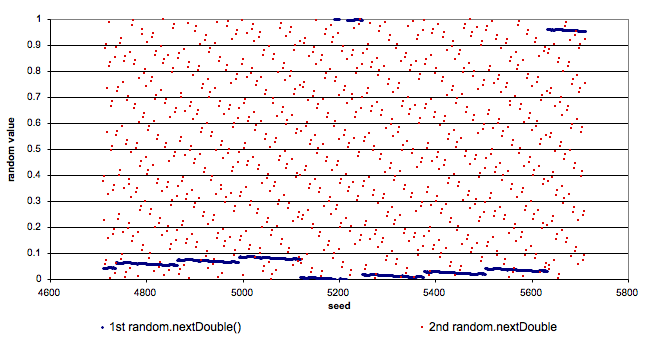Java-related information
MATSim is written in Java. While Java is widely known, from time to time we stumble over certain features or specialities we’d like to highlight. This is the place to collect interesting and informative stuff about Java which might (or might not) have some relation to our code.
Problems with HashMap, HashSet and Iterator
HashSet and HashMap do not specify in which order elements are iterated,
possibly resulting in different results if the same code is run multiple times.
This can lead to tests that randomly fail, further making debugging very hard.
Use LinkedHashSet/LinkedHashMap instead. Those can be iterated over
insertion order, leading to deterministic behavior.
Random Numbers
Introduction to random numbers
Our simulations depend heavily on random numbers. But despite using random numbers, we still want the simulations to be deterministic, so that results can be reproduced by running the same scenario a second time.
Usually, random numbers in Java are generated by calling Math.random():
double d = Math.random();
While this method returns a random number, the number is indeed random such as that in
a second run of the same scenario, other random numbers would result and the
simulation would no longer be deterministic. To overcome this problem, an instance
of java.util.Random can be generated and initialized with a custom random seed:
Random random = new Random();
random.setSeed(1234);
...
double d = random.nextDouble();
In this case, everytime the code is run, we get the same random numbers. As drawing
random numbers is widely used in the code, MATSim offers a global instance of Random,
which is automatically initialized with the seed specified in the configuration file:
import org.matsim.core.gbl.MatsimRandom;
...
double d = MatsimRandom.random.nextDouble();
Choosing a random seed
What value should be used as random seed? Is a value of 1 better than the
value 86294? As both numbers have the same probability to be chosen in the
range from 0 to Integer.MAX_VALUE, any value is equally good for a random seed.
But this is only half of the story. We all know, that these random numbers are only pseudo-random—and they depend on the chosen seed!
Using Random numbers in PlanAlgorithms
PlanAlgorithms could be executed in parallel in multiple threads, e.g. during
replanning. As the exact order of execution with multiple threads is not
deterministic, the usage of MatsimRandom.random would lead to non-deterministic
results. Instead, every instance of a PlanAlgorithm should have its own random
number generator. The best way to realize that is that PlanAlgorithms that
use random numbers have a constructor where an object of type java.util.Random
can be passed. When instantiating PlanAlgorithms, one can use
MatsimRandom.getLocalInstance() to obtain a Random-object that can be passed to
the PlanAlgorithm. A Random object received by getLocalInstance() is already
correctly initialized to return useful random numbers (see below).
Problems when setting the random seed
In our code, we set the random seed at the start of every iteration, so that we can restart a simulation at any iteration. The code was similar to the example code below:
int baseSeed; // the random seed specified in the configuration file
...
for (int iteration = 0; iteration < 1000; iteration++) {
MatsimRandom.random.setSeed(baseSeed + iteration);
... }
After running several iterations we realized that the first agent was never chosen
for re-planning (remember, they get “randomly” chosen for re-planning). A little bit
of research revealed that the first random number drawn after setting the random
seed depends heavily on the random seed! Only a slight change in the random seed
(in our case always +1 for each iteration) resulted in only a slight change
in the value of the random number. The following figure shows the distribution of
the first and second drawn random number after setting different random seeds.
As can be clearly seen, the first drawn number only moves in a very small range.
The second drawn numbers have a better distribution when the seed is only changed a little.
distribution of random numbers with differrent random seed

To overcome this problem, we decided that after setting a random seed, we draw one random number and immediately throw it away, as it seems not enough random.